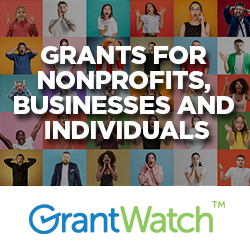Please confirm that you are not a bot
This Grant Does Not Exist.
We add new grants daily. Please check back tomorrow. You may also send an email to support@grantwatch.com to let us know what grant search criteria you would like us to post.
- Aging and Seniors
- Arts and Culture
- Awards
- BIPOC
- Business
- Capital Funding
- Children
- Climate Change
- College Scholarship
- Community and Economic Development
- Community Services
- Conflict Resolution
- Coronavirus COVID-19
- Disabilities
- Disaster Relief
- Domestic Violence
- Education
- Elementary Education
- EMS and Homeland Security
- Energy
- Entrepreneurs and Startups
- Environment and Conservation
- Faith Based
- Farming and Agriculture
- Financial Assistance
- Health and Medical
- Higher Education
- Homeless
- Housing
- In-Kind Support
- Individual
- International
- Justice and Juvenile Justice
- Literacy and Libraries
- Mental Health
- Municipalities
- Nutrition and Food
- Operating Support
- Pets and Animal Wildlife
- Preschool
- Preservation
- Quality of Life
- Refugee and Immigrant
- Research and Evaluation
- Science
- Secondary Education
- Small Business
- Social Justice
- Special Education
- Sports and Recreation
- Students
- Substance Abuse
- Teachers
- Technology
- Transportation
- Travel and Tourism
- Veterans and Military
- Women
- Women-Owned Startups and Businesses
- Workforce
- Youth and At-Risk Youth
- Aging and Seniors
- Arts and Culture
- Awards
- BIPOC
- Business
- Capital Funding
- Children
- Climate Change
- College Scholarship
- Community and Economic Development
- Community Services
- Conflict Resolution
- Coronavirus COVID-19
- Disabilities
- Disaster Relief
- Domestic Violence
- Education
- Elementary Education
- EMS and Homeland Security
- Energy
- Entrepreneurs and Startups
- Environment and Conservation
- Faith Based
- Farming and Agriculture
- Financial Assistance
- Health and Medical
- Higher Education
- Homeless
- Housing
- In-Kind Support
- Individual
- International
- Justice and Juvenile Justice
- Literacy and Libraries
- Mental Health
- Municipalities
- Nutrition and Food
- Operating Support
- Pets and Animal Wildlife
- Preschool
- Preservation
- Quality of Life
- Refugee and Immigrant
- Research and Evaluation
- Science
- Secondary Education
- Small Business
- Social Justice
- Special Education
- Sports and Recreation
- Students
- Substance Abuse
- Teachers
- Technology
- Transportation
- Travel and Tourism
- Veterans and Military
- Women
- Workforce
- Youth and At-Risk Youth

